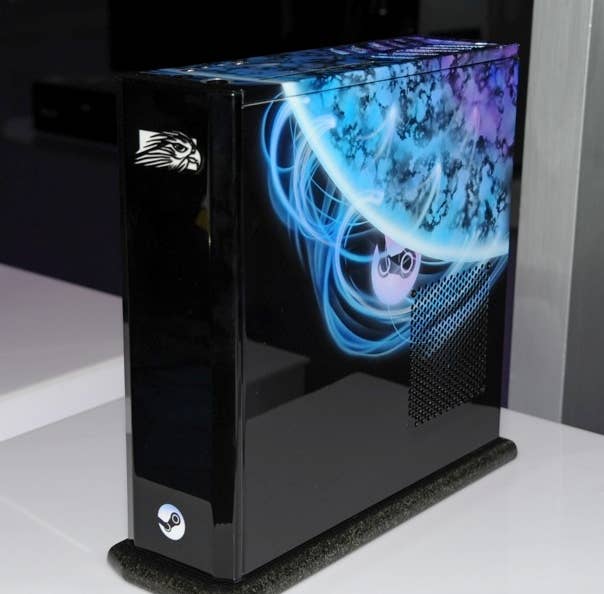Letting Off Steam
The pressure is on Valve to show why Steam Machines and SteamOS will be a viable game market
At least now we know Steam Machines aren't vaporware. Valve had what must be one of the briefest press conferences on record at CES yesterday, showing some prototypes of Steam Machines from 13 different manufacturers. Valve's leader Gabe Newell unveiled the devices, made a few remarks, answered a couple of questions, then exited, all in about seven minutes. "Rather than talking to me, go talk to the hardware manufacturers. Thanks for attending," Newell said as he turned off the mic.
It really was one of the more peculiar press events in memory. You would think that after drawing together representatives from major media outlets, who were obviously expecting a great deal of information and enthusiasm (why else announce a liveblog of the press event, as some sites did?) a company would spend some time feeding the media beast. What does this mean?
Let's break down what was actually announced, first. There's a list of manufacturers of Steam Machines and some partial specs given, along with some preliminary pricing (though no solid release dates). It looks like, from a cursory glance at the specs and prices presented, that Steam Machines will start at around the same price performance as next-gen consoles and move up from there, ranging from $399 up to $6000 (!). Many of the machines will apparently be flexible in configuration, with the buyer selecting the components before purchase (so the pricing will depend on the components selected).
Valve did not announce any particular games for these Steam Machines, other than to say that there are about 250 titles already running under SteamOS. Oh, and Steam has 65 million accounts now. Valve will produce its own Steam controllers, and others will as well, though no pricing was given. Further information and promotion is apparently up to the hardware manufacturers.

The conclusion to be drawn from this abbreviated press conference is that Valve either really isn't all that anxious about how this Steam Machine business turns out, or the serious advent of Steam Machines is still quite a ways out... or both. Valve's got a large, stable Steam business with no immediate threats, so some complacency is understandable.
The big, unanswered question: Who is the target market for Steam Machines, and why would they buy a Steam Machine instead of a PC or a next-gen console? Either it's the current Steam audience of PC gamers, or Valve is hoping to get new gamers to choose a Steam Machine instead of an Xbox One or a PlayStation 4.
Fundamentally, Steam Machines give you PC performance with the ability to hook into a TV. You can avoid the use of a keyboard and a mouse (awkward in a living room setting) by using Valve's Steam controller, but you'll have to learn a new set of reflexes. It's not clear how well this controller will work compared to the classic keyboard/mouse combo. Perhaps current Steam customers will be able to just play their current games on Steam Machines, though that will either require streaming (which may have some lag issues) or adapting to the different Steam controller interface. That's assuming the game you like has a SteamOS version, which right now isn't likely - but Valve is working to make that number grow.
"Ultimately, the entire Steam Machine/SteamOS initiative is a long-term hedge against what Microsoft may do in the future, freeing Valve from vulnerability to whatever moves Microsoft may make"
If you already have a game-playing PC, you're probably not eager to spend another $400 and up to be able to play your games on a TV - especially when you'd have to learn a new control interface. Valve needs to make this process easy, and the end result compelling enough that gamers will be eager to spend money on new hardware to make it happen.
As for new game players, you'd think the smoothly integrated experience provided by the Xbox One or the PS4, along with an impressive and growing roster of games (including a number of system exclusives) would be much more compelling than a similarly priced but rather opaque (at this point) Steam Machine. Still, the big advantage of Steam is the ability to get games at prices far below the usual $60 price point of new console games, if you are willing to wait for Steam sales (or just happy to play older games).
Valve has already gone on record to say that it won't be producing SteamOS-exclusive games, and therefore it's highly unlikely any publisher would do so. This removes another reason someone might buy a Steam Machine - sorry, no Half-Life 3 coming only on SteamOS.
Why is Valve putting in this enormous effort? First of all, while it's a lot of work, Valve isn't taking a big financial risk. They aren't manufacturing hardware, after all. For that matter, these PC makers who have signed up to make Steam Machines aren't facing the same sort of enormous investments that Sony and Microsoft made in next-gen consoles. Steam Machines are built using industry standard components; the only custom bit is the case, which these manufacturers are used to doing. They don't have to invest huge amounts of money in designing custom chips or exclusive software titles the Sony and Microsoft have had to do.
Ultimately, the entire Steam Machine/SteamOS initiative is a long-term hedge against what Microsoft may do in the future, freeing Valve from vulnerability to whatever moves Microsoft may make. For instance, Microsoft may want to someday force most Windows software to be sold through a Windows online store, and take a nice 30 percent cut of those sales. This could seriously damage Valve's Steam business, so the entire SteamOS project is a way to deal with that or other situations that may arise. It's always a risk to have your business heavily dependent on what a single other company may or may not do without warning (remember when Facebook suddenly decided to take 30 percent of all game revenue from Facebook games?).
Valve can take time to refine the OS, convince developers to make SteamOS versions of their games (and port older games, too), and work to get people buying Steam Machines. This is going to be a lengthy process, and there is a lot of work left for Valve to do. Perhaps most importantly, we'll have to see a much more serious, comprehensive marketing effort for Steam Machines to have a significant impact on gaming. Valve needs to turn up the heat to make Steam a powerful game presence.
Republished from our sister site the [a]list daily. For more, read the [a]list daily and subscribe to the newsletter to get the latest in game and entertainment marketing news, cool videos, incisive opinions, exclusive interviews and industry data.

